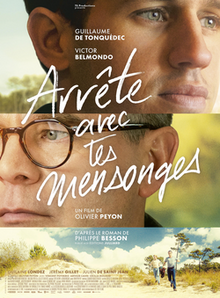
Aka Arrête avec tes mensonges ie Stop With Your Lies. I don’t like raking over the past. You either feel nostalgic or disappointed. Novelist Stéphane Belcourt (Guillaume de Tonquedec) agrees to be the guest of honour at a celebration for a famous brand of cognac, even though he does not drink alcohol. When he returns to his hometown of Cognac for the first time in 35 years, he meets Lucas (Victor Belmondo) the son of his first love, Thomas Andrieu (Julien de Saint-Jean) a handsome farm boy who disappeared after they had a relationship in their final year at the local lycee when Stéphane (Jeremy Gillet) was hoping to become a writer after university in Bordeaux. Lucas represents the brand in Los Angeles and is leading a group of Americans around the area on a tour. Stéphane and Lucas go on an occasionally painful journey of discovery about who Thomas really was and why he did what he did throughout his life while attending events, embarrassing the Americans and socialising with the bourgeois great and good. Lucas tells Stéphane his father was only happy when Stéphane would appear on television yet wouldn’t have his books in the house. Lucas concludes that Stéphane has been writing about Thomas for years. Then the revelation that Thomas committed suicide the previous years shakes the author out of his complacency and he realises Lucas is the person really behind his invitation … What was my father like? The source novel by Philippe Besson is a confessional memoir of sorts, so this is a generative text on several levels – a kind of roman a clef transposed into a different format where other forms of recognition take place, catharsis on the part of the leading men just the start. He only ever brightened up when you were on TV. Writerliness is one facet, gay life another, rites of passage in a small town yet another. Life here and with you are different things. They’re different worlds. It is however a photograph which gives rise to the greatest gear shift – presaged when Lucas takes Stéphane to the quarry which was his father’s favourite location to hide from the world. It’s not the author’s first time at that spot. You write to someone to make them present again. The emotions of youth, the impact of first love, the knowledge that nothing can be that sweet again, the disappointment of adult experience, all coalesce into radically antithetical futures for this boy from his past. Nothing can ever be as fun as having sex and dancing in that bedroom to the music of Téléphone. One of the most gratifying moments is Thomas seeing Stéphane wearing his band shirt in the school corridor. There is comedy and irony aplenty – from the vehicle swaps to the running joke that an author who avoids alcohol is here to celebrate an internationally acclaimed drink and his attempts at humour when he recounts to the group of American tourists a story of what happened to him in a West Hollywood bar when he did consume a glass filled to the brim with pastis is disarmingly shocking. And, in the pantheon of French performers there is another kind of recognition because those mobile features and sad-dog eyes can only belong to the grandson of Bebel, the latest generation of Belmondo to take on the acting mantle. He plays the deceitful trigger to the opening of old wounds with sentiment and aplomb. I already know I’ll never be this happy again. When Stéphane ends up freestyling his speech at the end the themes are summed up in his monologue. The book (translated from the French by Molly Ringwald) is a deeply gratifying literary experience. The film has different modes of address, fulfilling in another way. The screenplay is co-written by director Olivier Peyon, Vincent Poymiro, Arthur Cahn and Cécilia Rouaud. You’ll write about all this. You can’t help it